1986 - Year in SF&F: Reviews
|
THE WONDER TIMELINE: SF&F RETROSPECTIVE Read other issues here ----------------------------------------------   William Gibson "Count Zero" (nv) (Neuromancer #2) © IASFM, Jan 1986 Arbor House / Gollancz, 1986 --novel : 1987 Hugo --novel : 1987 Nebula --sf novel : 1987 Locus /3 --novel : 1987 British SF --novel : 1987 SF Chronicle /2 --/ third place sf novel --/ wonder award --/ idea award --/ style award --/ adventure award If Neuromancer planted the seed of cyberpunk, Count Zero sees it begin to flower and take deep root. It builds well on its predecessor; taking mind-blowing ideas and concepts of the previous book and developing them in unexpected, yet entirely natural, ways. From a narrative standpoint the book is chancier, following three protagonists, each enmeshed in their own lushly described Gibson-esque world (all taking place in familiar "Sprawl" setting), starting out far apart only to find their stories weaving together into essentially one crime epic, seen from three points of view. Gibson continues to saturate plot with small, sharp insights that cut through typical veneer ("sci-fi as just a wet-dream for nerds") and become rather profound tech predictions for some 50 years ahead. More than two decades after the original publication it remains an intense and cool-minded examination of humanity’s foibles, for example, world's seemingly insatiable desire for maddeningly intrusive and loud media. Young hackers, religious sub-culture idealists, art investors and businessmen see quite happy to navigate through grey areas of the law, guided by greed and notions of "creative destruction". Victims are led to believe they are predators, and vice versa. Corporate espionage provides predictable set of thrills. Voodoo and bizarre tech magic mixes with artificial intelligence, wild architecture and street culture - all this served with newly minted tech jargon and various ideas (which already may feel a bit dated, but only because they are so natural and so easily adopted in our world). If the book seems cold, it is not for lack of strong characters. Almost documentary-like, reminiscent perhaps of Truman Capote's mainstream classic "In Cold Blood", Count Zero method is detached observation rather than heart-wrenching melodrama. Somebody compared Gibson's style to listening to virtuoso jazz performance, and indeed, this book is brimming with disciplined improvisation and stylized burst of sheer orgasmic exuberance. Review by Baz Anderson ---------------------------------------------- 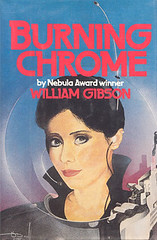  One of the most influential SF story collections was published in 1986: "BURNING CHROME" by William Gibson, heralding the advent of cyberpunk and setting new story-writing standards. Read the full review of this book: CLICK HERE ---------------------------------------------- 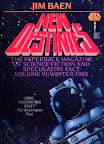 Roger McBride Allen Winged Mysteries—The Soviet Shuttles © Far Frontiers, Dec 1986 --/ cool article --/ rare find This is the most entertaining and interesting account of America's groping in the dark about the current (in 1986) Soviet space shuttle technology (as Roger McBride Allen points out "They steal nothing but the best technology") Well, the shuttles are no longer a mystery, of course, and we know how the whole shuttle era ended (see the detailed account in this DRB article: Rare Photos of the Russian "Buran" Space Program) - but this is very rare, paranoid take on the subject, and thoroughly enjoyable. Roger McBride Allen "Young As You Feel" © Far Frontiers, Dec 1986 --/ cool "mad scientist" sf story --/ wonder award --/ rare find The hilarious opening of that extremely rare story had me laughing, as it describes a two-year old kid "attacking" the parents in the most innocent way - the mess, the bother, the overall so-familiar situation... What develops next, is one of the more entertaining "mad scientist" plots in recent SF. Mind you, they don't write like that any more - this would be perfectly at home in the 1940s Astounding or "Thrilling Wonder" pulp: a youthfulness plague and "responsibility" cure. Good stuff, enjoyable. ---------------------------------------------- 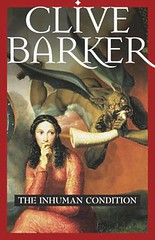 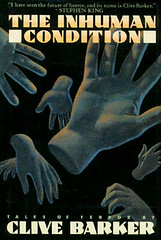 Clive Barker "The Inhuman Condition" (coll) (also as "The Book of Blood IV") © Simon & Schuster, 1984 --/ fourth place dark f collection --/ wonder award --/ shock value A scary and sobering collection of dark fantasy tales. Barker has a wicked imagination and these offerings are not for the faint of heart. However no one can deny the intensity and sheer "pop-culture" brilliance of some of the stories, which have become essential reading for any modern-day pulp-terror fiction reader. Here is the blurb from Amazon: "A master storyteller and unrivaled visionary, Clive Barker has mixed the real and unreal with the horrible and wonderful in more than twenty years of fantastic fiction. The Inhuman Condition is a masterwork of surrealistic terror, recounting tragedy with pragmatism, inspiring panic more than dread and evoking equal parts revulsion and delight." review: 31-Aug-06 (read in 1994) ---------------------------------------------- Terry Bisson "Talking Man" (nv) 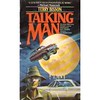 © 1986, Arbor House --novel : 1987 World Fantasy --fantasy novel : 1987 Locus /27 --/ fourth place f novel --/ wonder award --/ style award One of the best post-modern fantasy novels. Here is a review from "Publishers Weekly", could not say it better - "Having dreamt this world into being, the wizard called "Talking Man'' falls in love with what he has made and retires there. He lives in a house trailer on a Kentucky hillside close by his junkyard, and he only uses magic on the rare occasions he can't fix a car the other way. He'd be there still if his jealous codreamer Dgene hadn't decided to undo his creation and return this world to nothingness. When Talking Man lights out to stop her, he gives chase into a West that changes around them. The geography shimmers and melts, catfish big as boats are pulled from the Mississippi, the moon crumbles into luminous rings and refugees from burning cities choke the highways. A novel of the new South with a liberal dose of the old, fantastic and gothic, a road novel leading to the city at the end of time, a postmodern apocalypse you can drive to in a '62 Chrysler New Yorker... this is a charming, literate, laconic tale, deceptively brief, teasingly allusive and very entertaining." review: 09-Jul-06 (read in 2003) ---------------------------------------------- 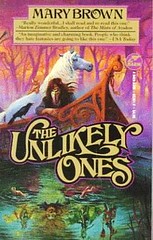 Mary Brown "The Unlikely Ones" (nv) © 1986, Baen Books --/ fourth place f novel --/ wonder award --/ style award Like a colorful blur, a fluid bubble, a russian "lubok" folk craft, or a dark porous chocolate with all kinds of microscopic "Kinder Surprise" toys in every delectable cavity, like a triple-calorie pudding eaten in a kaleidoscope flurry of roadtrip landscapes, this one disorients and delights at once. A very powerful fantasy, it maintains a dreamlike state throughout the whole narrative; a stand-out original work of fiction, which has been woefully underrated and sadly lost among other Baen Fantasy "paper-pointless fantasy-less clone-produced barely-alive" opuses. (Not that I have anything against this publisher, you notice...) However, this one rocks, and lucky is the reader who dips into the marvellous murk and swirling passages of this many-faceted book. Amazon readers are also at a loss how classify it. Beauty goes along with Ugliness in the magical quest to face and overcome the tainted side of each protagonist's heart, with a bittersweet ending... I repeat, "ending". Note that it's NOT a series, or a trilogy. Correct me if I'm wrong. But on the other hand it's like "A Series of Unfortunate Events" for adults, with amplified magic and weirdness. review: 19-Oct-06 (read in 1991) ---------------------------------------------- Orson Scott Card "Hatrack River"  (Alvin Maker series) © IASFM, Aug 1986 Hatrack River, 1988 --novelette : 1987 Hugo --novelette : 1987 Nebula --novella : 1987 World Fantasy W --novelette : 1987 Locus /2 --novelette : 1987 Asimov's Reader Poll /3 --novelette : 1987 SF Chronicle /2 (tie) Rural 19th century America, with homesteaders helped by Little Peggy's second sight, telling the story of the birth of Alvin Maker. Some other readers even classify it as "faintly annoying", although for me it just sunk into oblivion, not making any connection. A lot of people might like his folksy style, though, judging by the amount of awards. Some magical happenings in historical America... admittedly emotional passages and relationships... failed to spark my interest. review: 17-Jul-06 (read in 1992) ---------------------------------------------- 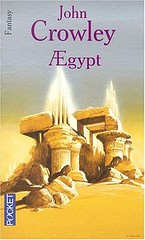 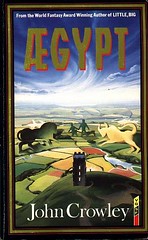 John Crowley "Aegypt" (nv) © 1986, Putnam --novel : 1988 World Fantasy --shortlist : 1988 Clarke --fantasy novel : 1988 Locus /6 --international fiction : 1989 Ditmar --/ cool f novel --/ wonder award The rich and rewarding novel about the "hidden history" of the world. As such, it echoes many "conspiracy-theory" novels like Illuminati, and Da Vinci Code. This one is for all interested in esoteric knowledge and magical symbolism, a distracting read, not to be taken seriously. It's a mind puzzle, a "melting pot" of different styles and plots, not a manual or textbook to learn from. There is an excellent review of this book, here review: 10-Jul-06 (read in 1989) ----------------------------------------------  John Farris "Wildwood" (nv) © 1986, Tor Books --/ fourth place dark f novel --/ wonder award --/ emotion award --/ shock value Superior fantasy horror novel, much better than most recent offerings. Highly recommended. It is the story of a densely wooded land near the Smoky Mountains called Wildwood. It is a place where twisted creatures, part animal and part man, roam; both beautiful and terrifying. Maybe even the best novel in exploring dark possibilities of the obscure woods. review: 07-Jul-06 (read in 1986) ---------------------------------------------- 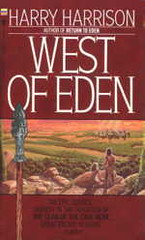 Harry Harrison "West of Eden" (nv)  (Eden #1) © 1986, Bantam Books --sf novel : 1985 Locus/7 --/ cool sf novel Cute trilogy. Cute idea. Cute little dinosaurs (see the "avatar" icon above) Harry Harrison loves to write about monsters, reptile and otherwise (witness his "Deathworld" troligy). In this book dinosaurs evolved into a sentient beings together with humans, and then started to cause all kinds of cultural and military problems (no bigger problems than the West had with hardcore communists, I imagine. Nothing could be more irrational and wild than a communist in an ideological rut). The novel contains some pretty panoramas and epic quests, but it left me essentially cold. Maybe his dinosaurs were too cute, after all. review: 19-Oct-06 (read in 1990) ---------------------------------------------- Robert Holdstock "Thorn"  © Birmingham SF Group, 1984 also in - F&SF, Oct 1986 The Bone Forest, 1991 --short story : 1987 Locus /8 --/ fourth place f story --/ wonder award --/ style award Holdstock's blend of a wondrous walk in the forest with the wild fantasy soars to the new high in this enchanting novelette. When you think he can not possibly be more visual and fantastically intense, he does it again. His stuff is highly recommended, but it's not for the faint of heart. If you are looking for the modern fantasy equivalent of Tolkien's Fangorn Forest, then you picked the right book. Just be aware that it is an upgraded monster edition, with the darker and more psychologically disturbing elements. review: 21-Oct-06 (read in 2003) 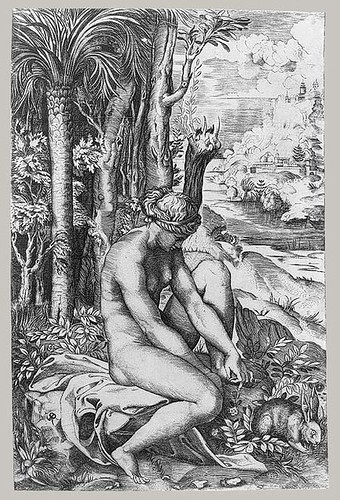 (Medieval art depicting "Venus and the Thorn") ----------------------------------------------  Philip C. Jennings "Teddy Bug and the Hot Purple Snowball" © Far Frontiers, Dec 1986 The Bug Life Chronicles, 1989 --/ fourth place space sf story --/ wonder award --/ idea award --/ style award This story deserves a better exposure... wonderful romp through the Solar System inside a prisoner's mind, transplanted into a Charles Stross Lobster-like or Bruce Sterling's Shizmatrix robotic environment: clean, precise prose with good adventure plot. Reminds me of the classic "Delilah and the Space Rigger" by Heinlein. Minds transplanted into space mining robots... can perhaps be scifi subgenre of its own! So many stories are using this theme. Robert Sheckley, Alfred Bester - the list goes on. But this is an extremely entertaining short example. ---------------------------------------------- 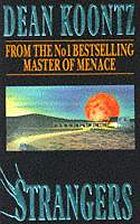 Dean R. Koontz "Strangers" (nv) © 1986, Berkley Books --novel : 1987 World Fantasy --/ cool sf novel --/ wonder award The definitive novel about UFO conspiracies, ESP conspiracies, fads and fans of surrounding movements. Has some genuine moments of scare and suspense in Arizona deserts and motels. I actually enjoyed it, except it suffers from the usual Koontz over-production. review: 10-Jul-06 (read in 1989) ---------------------------------------------- 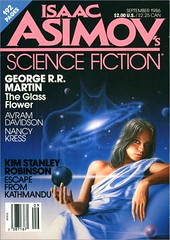 Nancy Kress "Down Behind Cuba Lake" © IASFM, Sep 1986 The Aliens of Earth, 1993 --/ third place sf story --/ wonder award --/ idea award --/ emotion award --/ style award --/ adventure award --/ rare find A gem of a story. So smoothly and beautifully written, that it gives you goose-bumps and a secret wish to write like that one day. This is an entry into "sentient terrain", "spooky earth" sub-genre (which can be traced back to the "Weird Tales" pulps and H. P. Lovecraft; see also my humble entry of a story "Subliminal Distances of the West" in writing section - also about getting lost in a landscape). Some kind of spacial/temporal hole swallows the unsuspecting female protagonist, who takes a wrong turn in a woody wilderness, bringing her to a malevolent, sentient (and very aggressive) lake - and causing her to reflect on her own lost and aimless lifestyle. It turns out to be so lost and aimless, that the story itself does not have an easily defined ending or direction, which is oddly appropriate in this case... This story is nothing like the wordy (and mostly uninvolving) novels of Nancy Kress. Go sample it, read it in a car on a prolonged roadtrip to Minnesota Lakes. See if this story will not stay with you for a lifetime... review: 27-Aug-06 (read in 2004) ---------------------------------------------- 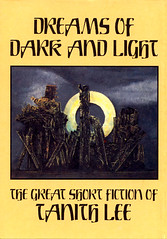 Tanith Lee "Dreams of Dark and Light" (coll) © Arkham House, 1986 --collection/anthology : 1987 World Fantasy --collection : 1987 Locus /14 --/ third place f collection --/ wonder award --/ style award --/ emotion award Definitive Tanith Lee collection; I would recommend to start with this book, if you are interested in this writer: very well crafted stories, some are fantasy masterpieces. It is only fitting that the book is published by renowned Arkham House - they did beautiful packaging. If only Tanith Lee would maintain such quality... the classic masters would be proud of such effort. But you know what happened later... review: 09-Jul-06 (read in 1992) ----------------------------------------------  George R. R. Martin "The Glass Flower" © IASFM, Sep 1986 Portraits of His Children, 1988 --Asimov's Reader's Poll 1987, novelette --Locus Poll Award 1987, novelette /7 --/ cool sf story --/ wonder award George Martin certainly can write space operas, with an intensely personal, lyrical, and yet grandiose sense. This is one of these rare stand-alone novellas, which are getting so hard to find these days when everybody seems to have jumped on "trilogies" and "series" bandwagon. Well, I liked it enough to give it a well-deserved "wonder award" (Martin let loose here on a particularly galaxy-shaking scale), but overall impression is muddy. Martin trades human characters (whom he can describe with depth and sympathy) with non-human and eternal super-beings, which we can hardly relate to. It is very adequate entertainment, but hardly anything more. Here is the blurb: "It's been a lifetime and more since Cyrain has been challenged in the game of mind. When the cyborg arrives, she senses a worthy and dangerous opponent - one that's been dead for 800 years..." Magazine publication has some cool artwork by Terry Lee, see below. review: 27-Aug-06 (read in 2004) 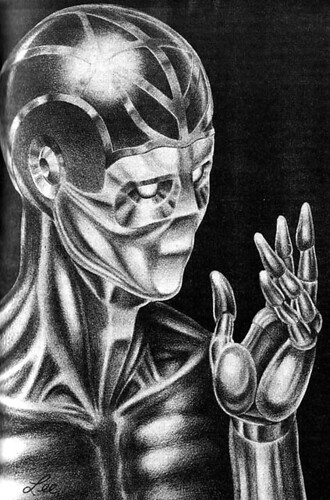 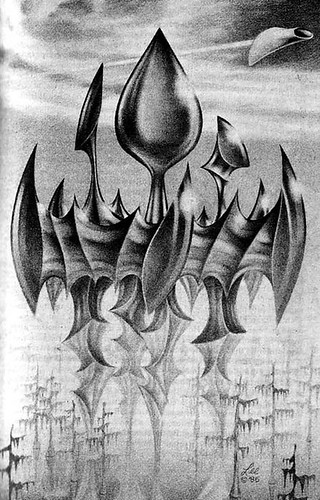 ---------------------------------------------- Kim Stanley Robinson "Escape From Kathmandu"  © IASFM, Sep 1986 Escape From Kathmandu, 1987 --novella : 1987 Hugo --novella : 1987 Nebula --novella : 1987 Locus /2 --novella : 1987 Asimov's Reader Poll /4 (tie) --novella : 1987 SF Chronicle /2 I can not click with fiction by Robinson... some kind of an emotional connection is missing, which makes me disinterested in whatever's happening by reading the first couple of pages. This novella tells of adventures in Nepal and of Yeti, but I "clicked out" of it quite promptly, so can not tell you more. review: 27-Aug-06 (read in 2004) ---------------------------------------------- 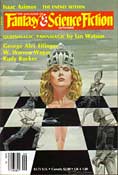 Rudy Rucker "Soft Death" © F&SF, Sep 1986 Gnarl!, 2000 --/ fourth place sf story --/ idea award --/ wonder award "Soft Death " postulates immortality through software engineering". It is a surprisingly Robert Sheckley-like story, giving a half-serious treatment to a single idea, and extrapolating the results on a future society. It also features a "life-box" device which records a person's lifelong sensory impressions on a chip (hardly a new concept, but we are talking 1986 here, which is the blooming of cyber-punk genre, so it feels right at home). We do not have "life-box" devices yet, but we have ... blogs instead. review: 27-Aug-06 (read in 2004) ----------------------------------------------  Bob Shaw "The Ragged Astronauts" (nv) "The Wooden Spaceships" "Fugitive Worlds" (Ragged Astronauts trilogy) © 1986, Gollancz --novel : 1987 Hugo --runner-up : 1987 Clarke /2 --sf novel : 1987 Locus /25 --novel : 1987 British SF W --/ fourth place sf novel --/ wonder award --/ idea award Two planets are so close to each other that they share an atmosphere, which makes space travel even easier than a cannon shot from Jules Verne's "From the Earth to the Moon". Wooden spaceships (and ornate baloons) ply the spaceways, loaded with the ragged astronauts (and also Victorian scientists, salon dames and other unlikely filibusters). They sweep majestically over the book's cover artwork and across the reader's minds. One of the truly original SF ideas in decades, it tends to haunt the imagination (just like Larry Niven's amazing "Integral Trees" or Barrington Bayley's splendid anachronisms) The plot could feel a bit cartoonish and too operatic - it's hard to focus on a single character among the great panorama of migration to the other planet - but the trilogy would make excellent graphic novels in the style of Moebius, "Heavy Metal" magazine, or Metabarons. However, if the first book was extraodrinary and terrific fun, the sequels are much slower and more clunky, albeit still enjoyable. The idea of sailing the interstellar void, powered by nothing except raw natural power (what the Good Lord provided) seems very popular with human imagination... Remember Tolkien's elfin ships, which sailed right off the edge of the Middle-Earth, or the recent cartoon "Treasure Planet" - something tells me we are going to see such amazing sights in the future, one way or the other... review: 19-Oct-06 (read in 2003)  (artwork copyright by Alan Gutierrez) ---------------------------------------------- 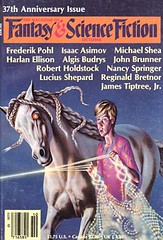 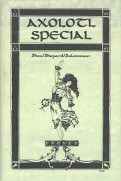 Michael Shea "Fill It With Regular" © F&SF, Oct 1986 Axolotl Special # 1, 1989 --novelette : 1987 Locus award /16 --/ third place sf story --/ wonder award --/ idea award --/ adventure award --/ style award --/ rare find One of these stories that set you on fire, plunk you into the chair, grab you by the bollocks and swing you out of the window of boring and mundane, into the Arctic cold of an inbridled imagination. Stories that put up a billboard on your forehead with "I am GREATLY impressed" brightly lit up; stories that cause a hiccup of startled respect everytime somebody mentiones this writer; stories that swoon and croon you in the night, intermittedly producing a bad dream or a glorious vision... they do all that, and then - they fall through the publishing cracks, through critic's yellowed weary fingers, slip down Amazon's lazy behemoth's back into a total neglect and silence by editors and reviewers alike. If you want any more succinct endorsement for that story, you won't get any - go and find the old tattered issue of "Magazine of Fantasy and Science Fiction", read it, bring it to the editors' place and pound them over the head until they reprint it (apparently, somebody did just that in Seattle in 1989 - it got reprinted in "Axolotl Special #1, ed. by John Pelan, Pulphouse/Axolotl Press) What the story is about? An eclectic mix of urban (suburban and countryside) fantasy, Lovecraft's "read it and weep" horrors, ecologically unclean creatures (such as the living breathing cars, fuel-infused blobs, "hills with eyes" and other arboreal fauna). Add to it Spielberg quality thrills and storytelling, and you get pure unadulterated reading joy. It would've went up to the second place in my book if it'd be a bit longer (hint, hint: worthy to expand into a novel) review: 21-Oct-06 (read in 2003) ---------------------------------------------- Lucius Shepard "The Arcevoalo"  (Kalimantan series) © F&SF, Oct 1986 Kalimantan, Tor 1993 --novelette : 1987 Locus award /9 --/ fourth place sf story --/ wonder award --/ style award This story did not stay in my memory other than as a "trippy" and exotic blur. However, I completely agree with this review (from Mike Prattle) "The Arcevoalo" still demonstrates one of the aspects about Shepard's writings I really appreciate, a blurring of the fantastic/occult aspects with reality so that there's always some sort of ambiguity to the experience. Like most of his great work, it's about the characters and their experiences, often how the interaction in a relationship changes because of a certain event. Oh, and the other thing: complex morality issues. Rarely is anything clear cut or black and white in Shepard's worlds." Some fantastic passages in this jungle Goddess tale will certainly enhance your afternoon tea ritual. review: 21-Oct-06 (read in 2003) ---------------------------------------------- Lucius Shepard "Aymara"  © IASFM, Aug 1986 The Ends of the Earth, 1991 --novelette : 1987 Nebula --novelette : 1987 Locus /7 --novelette : 1987 SF Chronicle W --/ cool sf story --/ wonder award --/ style award "Experimentation in time travel conducted in war-torn Central America, resolve all political perplexities through a quantum exhalation of love..." This also happens to summarize Shepard's fiction tendencies: original SF idea, presented on a war-torn background or other canvas of angst, leading to the final revelation of "goodness" and love, inherent even to the most hopeless characters. Which is why I like to read Shepard - the hope in his writing is not obvious, but still comes through, even after you finish reading, like a faint echo of a refracted ray. review: 17-Jul-06 (read in 1992) ---------------------------------------------- 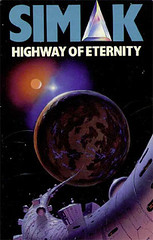 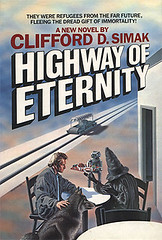 Clifford Simak "Highway Of Eternity" (nv) © 1986, Ballantine Del Rey --/ third place sf novel --/ wonder award --/ style award --/ adventure award --/ emotion award --/ awesome scale Very enjoyable, "cozy" in Simak's inimitable way, a dazzling romp through space (meeting all kinds of aliens of the Galactic Cluster) and time (to eternity and ... beyond?). All these good-natured "beer and cheese" adventures start in a small mid-western town and quickly scale outwards. This is one of the best novels of sheer "sense-of-wonder", mirroring Simak's previous success formula of the "Way Station". A guy who can teleport into the gray void, aliens who try to make people into indestructible disembodied minds, a Restaurant at the End of the Universe (who was there first, Simak or Adams?) There is a huge interstellar highway that goes through the void. This void contains nothing but a small restaurant maintained by a robot. Inside this restaurant (and all over time and space) the great riddle of sentient existence is being solved. This novel is colourful, intense and large-scale. All kinds of kudos to the great master. review: 31-Aug-06 (read in 1989) ---------------------------------------------- Nancy Springer "The Boy Who Plaited Manes"  © F&SF, Oct 1986 Chance & Oth. Gestures of the Hand of Fate, 1987 --short story : 1987 Hugo --short story : 1987 Nebula --short story : 1987 World Fantasy --short story : 1987 Locus /5 --/ cool f story --/ style award Nancy Springer belongs to the same school of quiet, lyrical family-friendly fantasy as Jane Yolen, Ursula Le Guin, Esther Friesner and Tanith Lee (only when Tanith Lee is in a good mood, of course). This story is the modern literature's answer to a plethora of "horse/children interaction" movies, starting with Elizabeth Taylor's "National Velvet" and up to last year's "Dreamer". Something definitely magical attracts us to the belief some children put in their favourite animals. Perhaps it plays on our wish to trust our own friends with the same innocence and intensity. Nancy Springer has always been excellent in portraying horses and other animals, and in this enchanting story she does not disappoint. review: 21-Oct-06 (read in 2003) ----------------------------------------------   Arkady & Boris Strugatskie "Khromaya Sudba" (nv) (also contains "Gadkie Lebedi") © written in 1975 1986, Neva Kromaya Sudba, 1990 --/ cool f novel --/ emotion award This is my first review of a russian SF book. I am fully aware that most of Russian science fiction is not translated into English and will not be known to the english reader; I am also aware of an incredible treasure of wonder and ideas contained in these works, completely different in their stylistic and philosophical approach. Languages are born to haunt us with their humbling diversity and an impossibility to learn all of them. We know that it serves to obstruct our wicked plans and to keep us humble, but it's a bit depressing to see cultural barriers grow as a result. Knowing more than one language immensely enriches a person when he reads (and digests) the best of a different culture. In this case, the strange and deeply introspective ventures into Russian fantastic literature may illuminate some forgotten and vast soul-realms that the american culture tends to overlook or simply bypass in haste. The Strugatskies have written both thrillers and psychological dramas, with an equally deft touch - but this novel is an experiment even by their own standards. They wrote it never intending to publish, or rather without a hope of it being published. It can hardly be classified as SF, as it has only minimal fantastic elements. It's a fascinating look into a life of a banished writer, its struggle with the government and other systems of the world. It is surreal and strange in composition (it contains a full, separate novel inside). A beautiful artistic achievement, though not perfect, of course. The title roughly translates as "An Impaired Destiny". review: 31-Aug-06 (read in 1989) 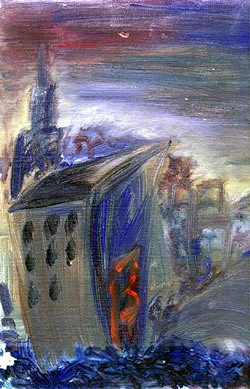 Art by Elena Evtushenko ----------------------------------------------   Arkady & Boris Strugatskie "Gadkie Lebedi" (nv) (also as "Vremya Dozhdya" © 1964 1987, Daugava (as "Prekrasny Utenok") © 1986, Izobretatel NF # 34, 1990 --/ cool sf novel --/ emotion award A little bit of a masochistic pleasure: deep and deeply troubled, downbeat and depressing condemnation of a communist era, devoid of hope and gray in imagery. Somebody had to write such Russian novel of a "still life" (literally), and Strugatskie did it, imbuing it with a large dose of surrealism and allegory. I am still awed by the fact that these writers (among other dissident figures of that generation) had to write "into a drawer" for decades(!) fighting the silencing veto placed on all their activity. Certainly, this piece of fiction trashes communist powers, but as a work of art it is quite harmless. But I remember a time in the Soviet Union when sending a fax, or making a copy (any copy of anything) was unlawful and condemned, not to mention any speaking with foreigners (in some cases, for the period of 15 years or more). It was a truly crazy lifestyle, and knowing that fantastic literature is eager to pick and exaggerate such anomalies, we have a "theater of the absurd" in guise of a novel, as a result. review: 31-Aug-06 (read in 1989) ----------------------------------------------  Michael Swanwick "Vacuum Flowers" (nv) © 1986, IASFM, Dec-Mar Ace Books, 1987 --novel : 1988 Locus/7 --/ third place sf novel --/ wonder award --/ style award There’s a lot of ways you could label Vacuum Flowers by Michael Swanwick: cyberpunk, post-cyberpunk, pre-transhuman, post-posthuman … and all those other silly labels pretentious science fiction reviewers and nit-picking analysts have been sticking on various books since the genre began to be taken -- or took itself -- too seriously. But I have a better label for it. One I think says a lot more about this delightful book than any pre- or post- definition anyone could give it. Sure, Vacuum Flowers does neatly fit into the cyberpunky domain (pre- or post- or whatever): set in an accessible where earth has been overrun by The Comprise, a voracious digital hive-mind, and the remaining free-will humans has escaped out into the solar system. The protagonist, Rebel Elizabeth Mudlark, begins the story like all good protagonists, as the subject of shadowy forces out to get something she possesses – and, naturally, what she isn’t exactly what she possesses. But what makes Swanwick’s novel so wonderfully unique is that Rebel isn’t really Rebel. Originally a restless personality tester, someone who tries on artificial identities, she did the unthinkable and found a perfect one for her – Rebel’s – and stole it. See, in the post/pre (whatever) world of Vacuum Flowers personalities, memories, abilities, are as changeable as putting on, or taking off, make-up. In fact, Swanwick is credited by many as being one of the first creators of wetware, the idea of ‘painting on’ software to do just that. And a lot of painting goes in Vacuum Flowers, but to Swanwick’s credit he takes this esoteric and possibly-confusing concept and makes it deceptively easy to understand, the book completely readable and totally enjoyable. Just like the best of Alfred Bester, Swanwick is also deliciously and dazzling inventive, each page sparkling with memorable details and dazzling inventiveness: a blindly-focused quasi-communistic society dedicated to terraforming Mars, a renegade ‘mob boss’ who entertains himself by twisting the minds of his prisoner/guests, a multiple-personality ‘hero’ who has just the right mind for pretty much any job … Swanwick coolly and seductively brings the reader into Rebel’s kaleidoscopically fantastic, yet completely real-feeling world. Yep, there are a lot of labels that could be tossed at Michael Swanwick’s Vacuum Flowers: post-this, post-that, transhuman, posthuman, cyberpunk ... whatever. The best label, though, and one that fits the novel so very well is one that every writer wants to get: A Really Good Book. Review by author M. Christian ---------------------------------------------- 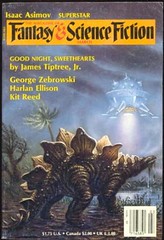 Robert Charles Wilson "A Knight of Antiquity" © F&SF, Jul 1986 --/ fourth place sf story --/ style award --/ rare find Touching and very human; great writing style - I would definitely try to read more of this writer. He reminds me of Theodore Sturgeon in top form.. some compliment, eh? review: 09-Jul-06 (read in 2002) ============================================= 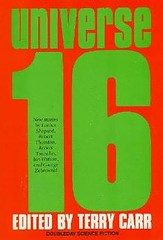 "Universe # 16", ed. by Terry Carr - review In 1986 a beautiful book came out: the original anthology "Universe #16", edited by Terry Carr. Two stories from this book ended up on SECOND PLACE in my ratings. The quality is astonishing. Too bad this anthology is out-of-print in its entirety. For reviews of stories included, go to this page ---------------------------------------------- Ronald Anthony Cross "Hotel Mind Slaves"  © Universe # 16, 1986 --novella : 1987 Locus /13 --/ second place sf story --/ wonder award --/ idea award --/ style award --/ awesome scale What a surprise! The novella of completely unknown to me writer jumped to second place, straight outpacing competion - well, it is wacky enough in the most grandiose way, to give you scale and ideas to feed your mind for a week to come. In the future, "hotels" evolve into their own independent empires, architecturally transform themselves into stupendous towers, oppressing and dominating the surrounding lands. It is a story of "break-away" from suffocating environment, comparable to "Against the Fall of Night", only with skewed psychedelic sensibilities. Cool. review: 09-Jul-06 (read in 1987) ---------------------------------------------- George Zebrowski "The Idea Trap"  © Universe # 16, 1986 Swift Thoughts, 2002 --short story : 1987 Locus /19 --/ second place sf story --/ idea award --/ wonder award --/ style award --/ awesome scale Absolutely mind-boggling play of ideas and total visionary "guilty pleasure". The ideas come to life literally as a "sort-of" clouds in the world divided between hunters and dreamers, and drift toward the sunset over the mysterious city, to be harvested later for food. This echoes the other story of this writer ("The Word Sweep"), where words and ideas take literal physical form and cause either endless "bother", or inspired breakthroughs, depending on the quality of these words/ideas. Nothing like that ever appeared in SF field before, so for originality alone, this story takes the cake. review: 09-Jul-06 (read in 1987) ---------------------------------------------- Ian Watson "The Legend of the Seven Who Found the True Egg of Lightning"  © Universe # 16, 1986 Salvage Rites and Other Stories, 1989 --/ cool sf story --/ style award "The Egg of Lightning", eh? What a wonderful idea alone. Maybe I should ask Ian Watson for rights to this idea and write epic fantasy about it. Or just give it to my son as a night-time story. Just kidding, of course, but maybe the egg of lightning is hatched by the flock of ruffled feathered thunder clouds, thunderously grumpy and sad with all these "teardrops of rain" review: 09-Jul-06 (read in 1987) ---------------------------------------------- Robert Reed "Treading in the Afterglow"  © Universe # 16, 1986 --/ fourth place sf story --/ wonder award I do not remember much what the story is about, except that is was competent, and enjoyable. It got "fourth place" , so it must've been "really" enjoyable. First appearance of Robert Reed under his own name. review: 09-Jul-06 (read in 1987) ---------------------------------------------- Lucius Shepard "Voyage South From Thousand Willows"  © Universe # 16, 1986 --short story : 1987 Locus /11 --/ fourth place sf story --/ wonder award --/ style award Magnificient tale. Looks like it was not reprinted ever since, which is quite amazing... Very poetic tale, having the signature Shepard style of intense emotional intimacy with the reader (which is a development, and improvement upon Harlan Ellison's style, more warm than Ellison, but unfortunately more uneven) review: 09-Jul-06 (read in 1987) =============================================== Meanwhile, in 1986 in the fantasy field... 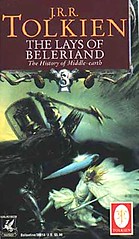 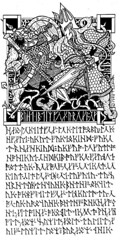 J. R. R. Tolkien "The Lays of Beleriand" (coll) (Middle-Earth: history 4) © Allen & Unwin, 1986 --/ FIRST place f collection --/ awesome scale --/ wonder award --/ idea award --/ adventure award --/ style award --/ romance award --/ emotion award --/ shock value No words necessary. For those who love "high fantasy" there could be no better catalyst to the imagination than these epic poems, in every line of which we find LIFE, DEATH, LOVE concentrated. Closest thing to the Bible (I mean the whole Middle-Earth series) For sheer intensity of legends, implied beauty and depths of destruction, this is it. review: 09-Jul-06 (read in 2003) 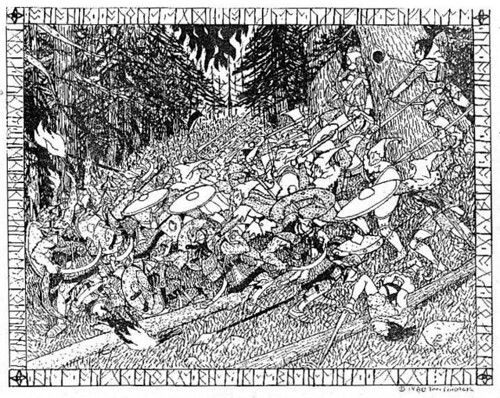 ---------------------------------------------- Return to the Wonder Timeline Labels: Timeline |
Click to go to "Dark Roasted Blend" site

|
Collecting Pulp Magazines Ephemera Interview with Avi Abrams |

|
Enchanting Victorian Fairy Tale Art "Then world behind and home ahead..." |

|
Exceptional British Scifi Artwork from the 1950s Space Pulp Art by Ron Turner and other British artists |

|
Pulp Pleasures: Eando Binder Great space adventure fiction from the 1930s "Where Eternity Ends" and other rare gems |
Also read recent posts:
Author's Pen Names - Most Complete List Ever
The Wonder Timeline: SF&F Restrospective
Space Adventure Article
|
"SF&F Reading Experience" is part of "Dark Roasted Blend / Thrilling Wonder" family of sites. We try to highlight the most entertaining and rewarding science fiction and fantasy, with emphasis on memorable reader experience, not necessarily general acceptance by the critics. Have fun, and delve into our extensive ratings and reviews! Most reviews are written by Avi Abrams, unless otherwise noted. Reviews also appear on our unique historical retrospective page Wonder Timeline of Science Fiction. Feel free to submit your own review, if a particular story is not listed here. All major OFFICIAL AWARDS are highlighted in BLUE ("winner" has a letter "W" by it, otherwise it is a runner-up only) Our PERSONAL AWARDS (ratings) are highlighted in RED and PURPLE: --/ first place : --/ second place : --/ third place : --/ fourth place : --/ cool : (equal to fifth place) ALL "BEST OF" LISTS ARE LOCATED HERE These awards are given in the following categories: - novel : - series : - novella : - story : - collection : Also, there are our personal STYLE / GENRE SPECIFIC AWARDS. These reflect the story's content and the lasting impression on the reader: --/ wonder award sense-of-wonder, "visual intensity" and inventiveness --/ idea award originality of idea / concept --/ adventure award exhilarating plot, excitement / action --/ style award outstanding literary qualities, inimitable style --/ romance award intense and beautiful love / relationships --/ humour award funny and cool --/ emotion award touching, lasting impression, sensitivity --/ shock value altogether wild --/ awesome scale mind-boggling; further enhances sense-of-wonder --/ rare find very hard to locate, mostly from old pulps, never reprinted, etc. Again, please feel free to leave your own review or comment under every writer's entry; also recommend us other stories you liked. |

0 Comments:
Post a Comment
<< Home